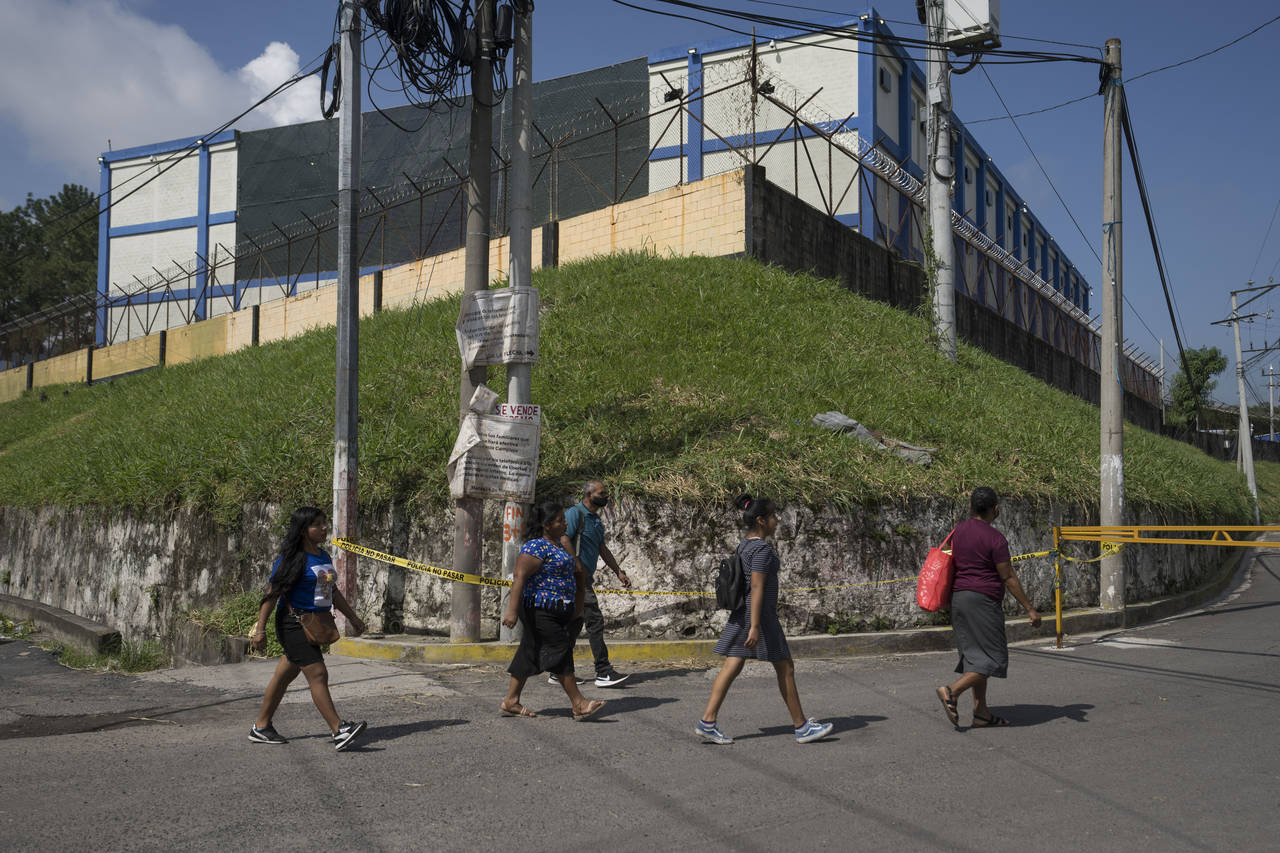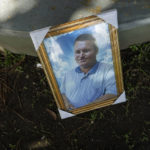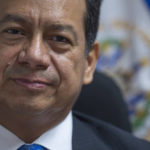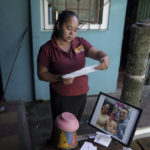Prison deaths mount in El Salvador’s gang crackdown
Oct 23, 2022, 6:21 PM | Updated: Oct 24, 2022, 10:42 am

People arrive to the Mariona prison, a main penitentiary for men, to deliver food and personal items for their relatives who were arrested under the ongoing state of exception, on the outskirts of San Salvador, El Salvador, Wednesday, Oct. 12, 2022. (AP Photo/Moises Castillo)
(AP Photo/Moises Castillo)
SAN SALVADOR, El Salvador (AP) — Jesús Joya says his brother was “special” — at 45, he was childlike, eager to please. He was as far from a gang member as anyone could be. And yet the last time he saw Henry, he was boarding a bus to prison.
“Henry, you’re going to get out,” Jesús shouted. “You haven’t done anything wrong.”
From his seat, Henry responded with a small wave. A police officer smacked him in the head.
Three weeks before, on March 26, El Salvador’s street gangs had killed 62 people across the country, igniting a nationwide furor. President Nayib Bukele and his allies in congress launched a war against the gangs and suspended constitutional rights.
Nearly seven months later, this “state of exception” is still widely popular. But gangsters are not the only ones caught up in a dragnet that has been haphazard, with fatal consequences.
The arrests of more than 55,000 people have swamped an already overwhelmed criminal justice system. Defendants have virtually no hope of getting individual attention from judges who hold hearings for as many as 300 defendants at a time; overworked public defenders juggle stacks of cases.
Defendants arrested on the thinnest of suspicions are dying in prison before any authority looks closely at their cases. At least 80 people arrested under the state of exception have succumbed without being convicted of anything, according to a network of non-governmental organizations trying to track them.
The government has provided no figures and has denied those organizations’ public information requests about the deaths. The information will not be released for seven years, authorities say.
Life in the prisons is brutal; the Bukele administration turned down AP requests to visit them. Defendants disappear into the system, leaving families to track them down. A month after Henry’s arrest, guards at the Mariona prison north of San Salvador told Jesús that Henry was no longer there. That’s all they would say.
A local newspaper photographer had captured the image of Henry, already dressed in prison whites, spotting Jesús in the crowd as he was taken away. For more than two months, Jesús carried a clipping of that photo to every prison in El Salvador, and then to every hospital.
Have you seen this man, he asked. Have you seen my brother?
___
When police and soldiers fanned out across El Salvador to make their arrests, Bukele tweeted the daily number of “terrorists” detained and talked tough about making their lives miserable.
Police and soldiers encircled neighborhoods or towns, set up checkpoints and searched door to door. They grabbed people standing in the street, commuting to work, at their jobs, in their homes. Sometimes it was a tattoo that got their attention, a picture in someone’s cell phone. Sometimes, they carried lists of names, people who had prior records or brushes with the law. They encouraged anonymous tipsters to drop a dime on gang members or their collaborators.
Some police commanders imposed arrest quotas and encouraged officers to massage details.
It quickly became apparent that the president’s plan did not extend beyond making mass arrests.
Lawmakers bought time by suspending arrestees’ access to lawyers, extending from three days to 15 days the period someone could be held without charges and lifting the cap for how long someone could be held before trial. Judges almost automatically sent those arrested to prison for six months while prosecutors tried to build cases.
One-third of the country’s most experienced judges had been driven into retirement last year by a legislative reform whose real motivation appeared to be stacking the courts with Bukele’s allies.
Unnamed judges ruling at hearings shielded from public view. The reasons some are released are as unclear as the reasons others were arrested.
The judges who remain are under tremendous pressure to go along with the president’s goals to protect their jobs, said Sidney Blanco Reyes, one of the judges forced to quit. “It’s as though the fate of those locked up depends on what the president says.”
Judge Juan Antonio Durán is one of the few judges still on the bench who has spoken out critically about the situation. Under one proposal circulating in the congress, Durán’s judicial career could end early next year if lawmakers lower the number of years a judge can serve to 25 years.
“The powerlessness that we feel is enormous,” Durán said. “It makes you sad to see how they’re treating people, because there are a lot of innocent people locked up.” Even those guilty of crimes, he said, deserve due process.
Congress ousted the members of the Constitutional chamber of the Supreme Court and replaced them with justices loyal to the administration in May of last year. Overnight, the court went from a check on Bukele’s power to one that gave him a green light to seek re-election despite a constitutional ban, something he confirmed he would do last month.
The new justices have not resolved a single habeas corpus petition — compelling the government to prove someone’s detention was justified — for anyone arrested under the state of exception, Durán said.
___
By the government’s own account, El Salvador’s prisons were already overcrowded before the war against the gangs. The president quickly announced the construction of a new mega prison, but it remains unfinished. Seven months later, El Salvador’s incarcerated population has more than doubled.
As a small number of detainees have been recently released on bail in recent weeks, accounts of horrific conditions inside the prisons began to emerge. But Zaira Navas, a lawyer with the non-governmental organization Cristosal, said very few people have been willing to speak, because of the likelihood they would be sent back to prison.
“They have told us that they have seen when bodies are taken out of some prisons,” Navas said. Prisoners are packed into cells and defecate in open receptacles that aren’t emptied until full. They subsist on a couple corn tortillas per day and lack clean drinking water.
Generally, the deaths stem from unattended injuries sustained in beatings during their capture, chronic illnesses for which prisoners do not receive treatment, aggression from other inmates or deplorable sanitary conditions, Navas said. Often, prison guards only allow medical treatment when others sharing the cell make a ruckus.
The prison deaths are almost always confirmed when a funeral home calls a family member of the deceased. There is no direct communication from the government. “There is interest in hiding these deaths,” said Navas, and so they are blamed on natural causes. There is no autopsy, no investigation.
Most often, the cause is listed as pulmonary edema, a filling of the lungs with fluid. Nancy Cruz de Quintanilla said when she went to the morgue and tried to get close to her husband’s body, workers told her to stay back — he had had COVID-19, they said. But there was no mention of that on the document they gave her. Only pulmonary edema.
José Mauricio Quintanilla Medrano, a local small businessman and part-time evangelical preacher, had been eating in a local restaurant with Cruz and their two children on June 25, when a couple of police officers came in for food. After the family had finished, the police came to their table and asked to see Quintanilla’s identification and cell phone.
Later, the police report would claim that the officers found Quintanilla alone in another neighborhood after a tip about a suspicious person. Cruz said the police were just trying to meet their quota.
From the local police station in San Miguel, not far from El Salvador’s eastern border with Honduras, Quintanilla was allowed to make one brief phone call to his father. Quintanilla told him that he would be held there for 15 days while police investigated and then released. That was the last contact any relative had with him. He was bused three days later to Mariona prison on the capital’s north side.
Cruz got the call from the funeral home in August. “Give me my husband,” she screamed.
Cruz agrees that gangs are a plague. “The truth is that no one opposes them grabbing criminals from the gangs, nobody … The only thing the people ask and I said is, why don’t they investigate before taking someone?”
___
Guillermo Gallegos, a vice president in El Salvador’s Legislative Assembly, concedes mistakes have been made and said it was a “tragedy” when they occur. But he sees no reason to lift the state of exception anytime soon. He noted that more people were being released on bail, which he took as a sign that the system was working.
He attributed the prison deaths to rivalries between jailed gang members. He raised doubts about claims of arbitrary detentions. It is very hard, he said, for a mother to admit her son was a gang member or collaborated with them.
Gallegos said he expected the state of exception will continue for another six months — long enough, he said, to lock up all the 30,000 gang members he believes remain at large.
They should be kept behind bars for as long as possible, said Gallegos, who is also a proponent of the death penalty in El Salvador. “They can’t be rehabilitated, there’s no reinsertion.”
If that sounds harsh, it is not far out of line with many Salvadorans when it comes to the gangs.
This month, pollster CID Gallup published a survey that put Bukele’s approval ratings at 86%. In an August poll, CID Gallup found that 95% of Salvadorans considered the government’s performance on security positive, 84% said security had improved during the previous four months and 85% expressed support for implementing harsher measures against gang members.
The public support can be explained in large part by the gangs’ years-long, brutal reign. After forming in Salvadoran immigrant communities in Los Angeles in the 1970s and 1980s, gang members brought their criminal networks back to El Salvador. They forcibly recruited children and executed people at will. They extorted even the smallest business owners to the point many simply closed.
They also showed they could operate while their leadership was imprisoned, raising questions about whether Bukele’s government can arrest its way out of a persistent security problem.
Johnny Wright, an opposition lawmaker, said the administration will continue seeking extensions of the state of exception because it does not have a plan for what comes next. Bukele entered office talking about rehabilitation, prevention and early interventions in marginalized neighborhoods, but that rhetoric has been forgotten, Wright said.
“I believe government’s main focus is how to keep itself in power,” Wright said.
___
Henry Joya lived in a single room in Luz, a San Salvador neighborhood notorious for its gangs. Henry and Jesús had been there for some 35 years, and Henry was a well-known figure, polite and friendly. Neighbors would give him small sums for taking out their trash and cleaning their yards.
Jesús Joya paid $50 a month for Henry’s room in a modest boardinghouse on a narrow alley where he said he made sure there were no gang members. Henry had a long-time female companion who rented a room in the same building.
Two days before Henry’s arrest, Jesús had talked to him about the state of exception and warned him to stay inside. “Be really careful, go to bed early,” Jesús said. Henry said he would only go to work.
A neighbor, who spoke on condition of anonymity for fear of attracting police attention, said he heard three loud knocks on the door to Henry’s building on the night of April 19. On the fourth, someone shouted “Police!”
The neighbor glimpsed police and soldiers. Henry did not put up any resistance and the neighbor heard him say nothing as he was led away. Henry’s companion cried hysterically. Police told her that if Henry had done nothing wrong, he would be released the following day.
By the time Jesús ran up the hill from his house, the police and Henry were gone.
Jesús’ search for his brother ended in September. He forced himself to go to the morgue and give the clerks his brother’s name: Henry Eleazar Joya Jovel.
They found that a Henry Cuellar Jovel had died in the Mariona prison on May 25, barely a month after Henry had waved from the bus. The government had buried this man in a common grave on July 8.
Jesús asked to see photographs of the body, and his worst fears were confirmed.
The official cause of death? Pulmonary edema.
Jesús Joya has worked to correct his brother’s name, which he believes was misrendered by authorities to obscure his death. He convinced the government to exhume Henry’s body so that he could be buried where their grandparents lived, but first he brought the casket back to his neighborhood, so all the friends of this man could say goodbye.
Jesús still cannot understand how this happened.
The prison “had my phone number,” he said. “I haven’t changed my number in 15 years here in El Salvador and they never told me: ‘Look, your brother is sick; look, this happened to your brother.'”
“He was in good health,” he said. “The only thing wrong was his head.”
Copyright © The Associated Press. All rights reserved. This material may not be published, broadcast, rewritten or redistributed.






































